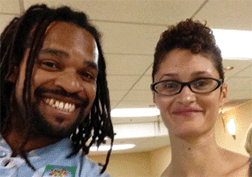 CB Internship Program
CB Internship Program
Community Boards’ Neighborhood Mediation Program is the longest-running public mediation program in the US. In 2013, we expanded its services to include one-to-one conflict coaching. Joining our CB Internship Program will provide you with valuable, real-life, hands-on experience, working as an integral part of our public service.
Interns have multiple responsibilities critical to the Neighborhood Mediation Program. They provide initial case intake by interviewing, answering questions, and empathizing with prospective mediation clients. They assist in case development and management, and handle other tasks related to the day-to-day operations of a grassroots community service.
Individualized special projects that support our mission, programs, and services can be developed, each tailored to an intern’s special needs or requirements.
Since Community Boards offers its services citywide in San Francisco, we are always eager to place interns who speak Spanish, Mandarin, and Cantonese either as a first language or with comfortable fluency.
Community Boards accepts local and international students, as well as non-student individuals seeking opportunities to share their own expertise while expanding their skill sets.
Questions?
Sarah Moss, Mediation and Training Coordinator, smoss@communityboards.org.
Requirements
Ideally, interns are requested to work for a minimum of 4 months (a semester) and at least one full day (10 am-5 pm) per week. Special arrangements can be made for half-days of 10 am-1:30 pm or 1:30 pm-5 pm. Internships at Community Boards are non-paying. We welcome and encourage interns of all backgrounds.
Downloads: Internship Program Description | Intern Application Form
Qualifications
- Good telephone and communication skills
- Ability to empathize without taking sides
- Patience while working with angry, frustrated, or upset callers
- Familiarity with data entry
- Fluency in Spanish, Cantonese, or Mandarin is a plus
Intern Activities
Intakes & Case Openings
- Initiate case intake process with Party 1, the person having difficulty who initially contacts Community Boards for assistance
- Intakes are primarily by telephone, either by answering calls during business hours or replying to online intake requests
- Intakes also include walk-ins during business hours
- When speaking with Party 1, explain Community Boards’ services and role of mediation
- Listen to caller’s issue(s) and ask clarifying questions
- Determine if mediation is appropriate
- If appropriate, open a case for Party 1
- Provide referrals when mediation isn’t appropriate
- Collect demographic data
Program Administration
- Check for online intake requests
- Enter data from P1 phone conversation or meeting in Case Manager database
- Follow-up telephone “mediation satisfaction” survey
- Ongoing clerical assistance
Outreach and Public Education
- Staff informational tables at events and gatherings
- Make outreach presentations
- Assist with social media

